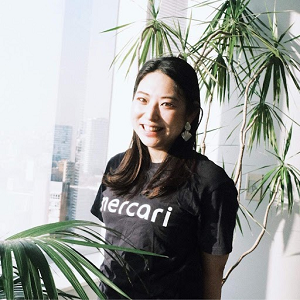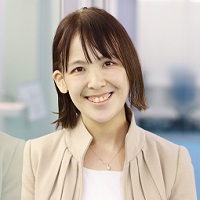
2023-3-27
Can You Fake Agreement with a Company’s Mission and Values? A Mercari Recruiter Shares Insider Perspective Behind Recruiting Engineers, Seeing the Essence of Job Seekers
※This article is a repost from Engineer type.
From a series in which Type’s editor-in-chief interviews HR professionals from well-known companies
Behind the scenes—asking the important questions that engineers want to know about hiring!
In this series, Risa Mitsuhashi, the editor-in-chief of career change website “Type”, takes us behind the scenes of the hiring process by holding interviews with HR personnel at companies that are both well-known and popular places for engineers to change jobs to. In the interviews, she asks them about aspects of hiring such as the selection process and what kind of engineers they are looking for right now. In the first installment of this series, Ms. Mitsuhashi visited Mercari, whose mission at the time of the interviews was “Create value in a global marketplace where anyone can buy & sell.”1
1. Since February 1, 2023, Mercari Group has been operating under their new Group mission: “Circulate all forms of value to unleash the potential in all people.”
Aiming to be a truly global tech company with world-class technology, organization, and culture, Mercari has been hiring engineers with diverse backgrounds from both Japan and abroad for the past several years.
What kind of skills and mindset does a company like Mercari seek in engineers?
We asked two people who are in charge of mid-career recruiting at the company, Maho Hashimoto and Reika Seya, about what they emphasize during the selection process and their tips for engineers to change jobs without any lingering regrets.
Featured in this article
-

Maho HashimotoMercari, Inc. Marketplace Talent Acquisition, Manager
Joined Mercari in November 2018. After working in recruiting for both engineering and corporate positions, Maho became manager of the Marketplace Talent Acquisition team in April of 2021. Mercari Careers site: Engineering/People -

Reika SeyaMerpay, Inc. Fintech Talent Acquisition, Recruiter
Joined Merpay in October 2018. After working in divisions like HR and Merchant, Reika pivoted to HRBP/Recruiter at Merpay in July of 2021. She is currently in charge of recruiting primarily for engineering and corporate positions. -

Risa MitsuhashiType Editor-in-Chief
Joined Career Design Center Co., Ltd., in April 2006. After working as editor of the career change information magazine “Womantype,” she became involved with UI/UX improvements and website redesign for Women’s Career Change @type (now, “Women’s Career Change Type”). From April 2013 to December 2015, Risa was the editor-in-chief of Women’s Career Change @type (now, “Women’s Career Change Type”). In November 2016, after returning from childbirth and childcare leave, Risa resumed her current position as editor-in-chief of the @type (now, “type”) career change website. Risa took childbirth and childcare leave for a second time in October 2019, returning to work in May of 2021. Since June 2021, Risa has held her current position as editor-in-chief of Type.
Even with an influx of applications, hiring engineers is still an uphill battle
Mitsuhashi:Lots of engineers say that they want to work for Mercari— have there been any changes in recruitment over the past year or two?
Hashimoto:Due to the depreciation in value of the yen, it has become particularly difficult to hire engineers from abroad compared to before. When converted to Japanese yen, the compensation offer seems much lower to many candidates, so we get a lot of people declining the offer, saying that they will simply work in a different country.
Seya:I think that it’s also difficult to hire engineers in Japan in general—and that’s not just limited to the past one or two years. So while I am grateful for all of the applications we receive, it is difficult to hire people who have the skills and share the mindset that we are looking for—I feel that this has only become more difficult in recent years.
Mitsuhashi:It’s surprising to hear that you are struggling with recruitment. Do you think this is because there just aren’t a lot of engineers in the market who have the high-level skill set and the shared values that Mercari is after?
Seya:I think that’s the reason, yes. However, since the introduction of the Your Choice policy during the pandemic, Mercari employees are free to choose their own working hours and location, so the area from which we can source engineers has expanded from just the Kanto area to the entire country. In that sense, I think our opportunities for recruitment have expanded as well.

Mitsuhashi:So could you describe your ideal engineering candidate?
Hashimoto:Having the technical skills to contribute to business growth and shared belief in our mission and values are musts, but what we really emphasize is whether or not someone has experience working in a multicultural environment with people of many different nationalities and cultures. We also look for candidates with experience in leading extremely high-level development projects. These are the kind of things we look for in our selection process.
Seya:I would add that, in terms of recruiting for Merpay and Mercoin—the companies I am in charge of recruiting for—they operate in areas with a high degree of uncertainty, and changes to the organization and development structure are likely. Given those circumstances, I think that good-fit candidates are people who are capable of working autonomously in a rapidly changing environment, and even enjoy the change.
Mitsuhashi:Has the type of candidate you are looking for changed as the company and the services you provide move through different phases of growth?
Hashimoto:Yes, I think so. During the start up period, and when the company was growing rapidly, we hired lots of engineers who had a shared belief in our mission and values and could start work immediately.

Hashimoto:Right now, however, we are especially looking for senior-level engineers who can help grow our organization and services over the medium-to-long-term.
Mitsuhashi:Since last year, Mercari has been working hard to strengthen its technical infrastructure. So, what kind of engineers do you think can contribute to that?
Hashimoto:We also need people who love solving complex technical issues. Because the business environment for these roles is so uncertain, we need critical thinkers who can work on solutions to problems on their own, rather than simply doing what they are told.

Mercari’s selection process for hiring engineers is conducted in the following order: document screening → technical assignment → interviews (roughly 3 rounds) → offer (Mercari also conducts reference checks at this stage). Additionally, the interview process employs a behavioral interview method called “STAR,” which is used to explore each candidate’s personality and values in-depth by asking targeted questions about a candidate’s past actions.
Mitsuhashi:Could you tell us a bit more about the selection process at Mercari? What do you look for in the initial document screening?
Hashimoto:We look at a candidate’s past experience and whether or not they have the necessary technical skills. With regard to the technical skills, we come to a consensus based on the candidate’s GitHub account and their resume, which are checked by both HR and Mercari engineers.
Seya:I think that Hashimoto mentioned this earlier, but we also check for things like whether or not a candidate has experience working in diverse environments and whether they have experience leading development projects. This is to make sure that the candidate is a match for the particular roles we are currently looking to fill. Also, for Merpay and Mercoin specifically, while experience with microservices and the financial industry are not required, they are often a plus because they allow new hires to catch up quickly after joining the company and can also help candidates better understand our mission. Of course, it is not absolutely necessary to have those qualities—there are many people currently employed at Mercari without such experience—but it is definitely a plus.
Mitsuhashi:What things on a resume jump out at you and make you want to interview the candidate?
Hashimoto:The best thing a candidate can do to make our decision easier is to clearly describe their own achievements in detail. Sometimes, we get applicants who list great achievements on their resumes, but it is difficult to tell whether they are team or individual achievements, which is a shame because that makes it harder for us to pass that person to the interview stage.
Mitsuhashi:What do you do in those cases? If you are interested in a candidate, but you can’t tell much about them just from their resume, do you drop them or do you try to interview them anyway?
Hashimoto:I would prefer to interview them first. Or, I may ask them to resubmit their resume, asking for more details in certain places.
Seya:It’s much easier to imagine yourself working with a candidate if you can get a concrete image of them in your head from what they’ve written on their resume—like past roles and times when they were able to demonstrate their skills. However, we understand that you can’t always include everything in one resume, so it is helpful when candidates also include supplementary materials like their personal blogs or GitHub accounts that highlight their technical skills and achievements.
Hashimoto:At Mercari, we have a culture of communicating through text by documenting information on the job, so the skill to convey information correctly in writing will be tested even after joining the company. So, from that perspective, we emphasize the accuracy of resumes as well.
Past actions demonstrate whether candidates truly have a shared belief in our mission and values
Mitsuhashi:I think Mercari does a great job of publicizing hiring-related information, especially through Mercan, your owned media site, and I could see how that helps candidates prepare better for the interviews. What are your thoughts on this?
Hashimoto:For sure—I definitely get the impression that Japanese engineers read Mercan articles and other information in advance to prepare for their interviews. I don’t mean to say that applicants who can’t speak Japanese don’t prepare, but since our services are only available in Japanese and information that is available in places like Mercan articles is generally less available in English, I think it is harder for candidates who do not speak Japanese to prepare in the same way. So it’s not like we just take the candidate’s word for it—we also want to find out whether they have actually done work that truly embodies our values and whether they will be able to reproduce those achievements at Mercari. Preparing in advance by using Mercan articles isn’t the only way to have a successful interview.
Mitsuhashi:But don’t you find it difficult to truly get to know who a candidate is as a person in just the short time of an interview?
Hashimoto:It can be challenging, but to combat that difficulty we use an interview method called “STAR” and ask questions that are aligned with Mercari’s three values of Go Bold, All for One, and Be a Pro. That is the framework we use to evaluate the candidate—how do their past actions align with our values? Basically, we’re not just taking their word for it (written or verbal); we have our own targeted method of evaluating if someone will be a good fit for our culture, so it would be pretty difficult for them to fake it.

Mitsuhashi:I see, so that’s how you determine whether a candidate’s values and actions would be a good fit for Mercari. With this system, I imagine that your interviewers have to be pretty skilled as well—is this something that Mercari emphasizes?
Hashimoto:Our interviewers undergo training provided by the company. We also have them attend our Unconscious Bias Workshops to ensure that each candidate is evaluated fairly.
Mitsuhashi:That sounds very thorough. Before, you mentioned that candidates generally go through three rounds of interviews—what is the focus of each one?
Hashimoto:In the first round, Mercari engineers primarily evaluate the candidate’s skill set, including technical skills, to determine if they meet the requirements for the role. In the second round, a manager serves as the interviewer and determines whether or not the candidate would be a good culture fit for Mercari. The final round is an interview with someone at the executive level. In this round, the interviewers are trying to find anything that might have been overlooked in the previous round, basically determining whether the applicant can contribute to the business in line with our mission and values.
Mitsuhashi:What do you do with a candidate who is a great culture fit, but maybe lacking on the technical skills side? Do you hire them anyway and aim to improve their skill set on the job, or is the lack of technical skills an immediate deal-breaker?
Hashimoto:In general, we do not make offers to candidates who don’t meet the technical skill requirements. However, we also try to maintain a connection with candidates even after the selection process is over, so we will sometimes ask a candidate to apply again in the future or inform them that we can’t offer them a position at this time but that we will keep them in mind and reach out in the future if something comes up. We welcome all candidates to apply again after they have developed their skills in other environments.
Seya:At Merpay and Mercoin, the skill level we are looking for differs depending on what the team needs at that time. So, assuming that a candidate has at least passed the technical skill check, we may hire them if we notice through the interviews that their soft skills are high-level and that they are a match for our mission and values. For example, Merpay’s backend is developed using Golang. Even if the candidate’s Golang skills are not at a competitive level at the time of selection, if we see that the candidate has the potential to improve, we may decide to hire and train them on the job. Actually, we have many members who joined with no experience in Golang and are now able to play an active role in development.
Don’t try to fake it just to get the job
Mitsuhashi:From what we’ve talked about so far, I can see that Mercari is very selective in terms of the people you hire. I can also see that Mercari puts a lot of emphasis on training interviewers. Even with all of these measures in place, do you still experience hiring mismatches?
Seya:Though they are rare, I must say that unfortunately mismatches do still occur, despite all of our efforts. It could be that the person was not as technically skilled as we thought, or that the culture fit wasn’t right.
Mitsuhashi:Why do you think that happens?
Seya:As I mentioned earlier, because there is a lot of information out there to help candidates prepare for the interviews, some people try to fake it in order to get the job—even if they don’t actually have a shared belief in our mission and values. It’s good to prepare anecdotes that highlight how you have demonstrated Mercari’s values in the past, but if these anecdotes are too exaggerated just to pass the interview, both parties will suffer because our expectations do not match what the candidate is actually capable of doing after they have joined the company.
Mitsuhashi:The best way to change jobs with no regrets is to be your authentic self—not pretend to be who you think the company wants you to be.
Seya:That’s exactly right. In the interview, most people will say that they have a shared belief in our mission and values, but I would ask any applicant to be honest with themselves and think about whether they really do feel that way. I don’t think you have to force yourself to conform with what we expect just because you want to receive a job offer. Our policy is not to only hire people with a certain set of values—there is no problem with someone sharing their own unique values with us as long as they are also genuinely willing to work with us toward building the future of Mercari. In fact, we welcome that! Candidates should decide for themselves whether Mercari really is the best fit for them without pretending to be someone who they are not.
Hashimoto:To add to that, I think that many of the people who have been with us for a long time are not necessarily those who are the biggest fans of Mercari’s services, but those who definitely have a shared belief in our mission.
Mitsuhashi:You’re referring to the mission “Create value in a global marketplace where anyone can buy & sell,” correct?
Hashimoto:That’s right. Products and services can change or disappear entirely, but our mission is what keeps us aligned and moving in the same direction. To be honest, Mercari has created lots of new businesses, and over the years some of them haven’t worked out. So if you only want to work at Mercari because you like a particular service, you’ll likely lose your sense of purpose if that service were to ever get shut down. So, if a service doesn’t end up working out, the ideal mindset will be one that is focused on the next opportunity to pursue our mission. So if you genuinely believe in our mission, I think that you can enjoy working at Mercari for a long time.
Mitsuhashi:That’s an interesting perspective. This strikes me as very representative of Mercari’s “Go Bold” value—making bold decisions in creating new businesses, and also knowing when to pull out.
Hashimoto:Yes, and I think that if engineers choose a company because they agree with what the company is trying to achieve as opposed to what they are creating, they will not have any regrets about changing jobs.
Mitsuhashi:I think you’re absolutely right about that! Thank you both for taking the time to speak with me today!
- Text by Mayu
- Photographs and images courtesy of Mercari
- Reporting and editing by Risa Mitsuhashi and Chiaki Kurihara (both editors)


